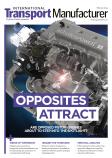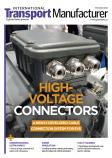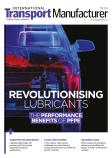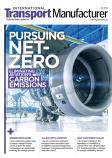The development of a more efficient regenerative electronic braking system is poised to provide enhanced brake management for electric trucks.
Regenerative braking is the process used by an electric vehicle (EV) to regain kinetic energy that would otherwise be lost during braking. This energy is instead returned to the car’s battery as electricity so it can be used to replenish range. These small boosts in battery range can accumulate and improve efficiency over time when used regularly.
Now, Tier 1 supplier ZF’s Commercial Vehicle Solutions (CVS) and EV manufacturer Tevva have teamed up to develop an enhanced regenerative braking system for the latter’s 7.5 tonne zero-emission battery electric trucks.
The Tevva HGV BEV
The trucks are based on Tevva’s own hydrogen fuel-cell range extension technology, and uses a blend of regenerative and compressed air brakes to add an extra layer of safety and responsiveness for drivers. Asher Bennett, Founder and CEO, explains: “For normal short distance operation, the truck will run as a normal BEV vehicle, with the energy to the motor being delivered solely from the battery. For longer trips, as the battery state of charge becomes low and/or when power demand is high, the hydrogen fuel cell will start up and supplement the battery with initially 25kW and up to 50kW of additional power. For high gradient and heavy load operation where the power demand is high, fuel cell and battery can feed the motor in parallel to ensure that the required power is always available.”
The Tevva BEV has been developed with several key design considerations that Bennett says differ from most other HGV BEVs on the market. “We have a twin motor and twin inverter system which allows for optimisation of motor power supply to ensure that the power can be delivered in the most efficient way at all times. It also allows for ‘limp home’ in the event of a single motor or single inverter failure,” he continues. “The switched reluctance motors have no rare earth metals which further enhances the environmental credentials of Tevva vehicles. Thirdly, the battery chemistry is Lithium Iron Phosphate which ensures great long-term durability as well as good thermal stability. Lastly, the unique Tevva exterior design sets the vehicle apart from all of the EV products from existing diesel vehicle manufacturers.”
Enhanced regen braking
To improve the range of its electric trucks, Tevva’s engineers successfully integrated ZF’s electronic brake system (EBS) with its vehicle control unit (VCU) to create a regenerative braking system capable of recuperating up to four times more energy than a traditional air brake system. The technological advancements achieved by the two companies has enabled the development of a modern EBS system to control the blending of friction braking with the e-motor, reducing brake wear and tear. The system transfers the driver’s deceleration request electronically to all braking system components to shorten response time, balance brake forces and provide ease of braking and efficient brake management.
“The key challenge for all EV propulsion engineers is to maximise the available regen power at all times without creating vehicle stability issues on wet or icy roads,” Bennett says. “Through cross functional working at MIRA in the UK and in ZF’s development centre in Germany, the team were able to ensure that the system is able to make use of vehicle sensors to deliver dry road regen energy recovery four times greater than for a non-integrated system.”
Tevva’s engineers successfully met a range of stringent testing criteria for the company’s truck to receive ZF’s approval, working on fine-tuning the truck’s VCU and enhance its compatibility with the EBS. Testing of the adapted system involved a variety of conditions, gradients and surface types at the ZF test track in Jeversen, Germany.
“Over 80,000 miles have been completed in vehicle testing and this has included hot weather and high altitude testing in Spain, cold weather testing in Finland, and braking system sign-off in Germany,” Bennett adds. “In the UK we have completed rolling road and durability testing at UTAC Milbrook, MIRA and on UK roads as well as customer miles in and around Manchester. This testing supports our European Whole Vehicle Type Approval certificate giving us confidence that the vehicle is not only ready for sale from a durability and compliance perspective, but also that it is a quieter, more comfortable, easier to drive and zero emissions alternative to diesel propulsion.”
The tests confirmed that the implementation of the EBS into the Tevva VCU allowed for a safe incorporation of regenerative braking up to 180kW, whereas the traditional air brake system had limited passive regen to around 40kW due to safety considerations. Tevva’s 7.5 tonne BEV truck has now begun mass production at the company’s London facility, and will be followed by a 7.5 tonned hydrogen electric truck benefiting from a hydrogen range extender enhancing vehicle range to 354 miles. The Tevva BEV offers up to 140 miles (227km) from its 105kWh battery on a single charge and is ideal for last-mile and urban delivery fleets.

















